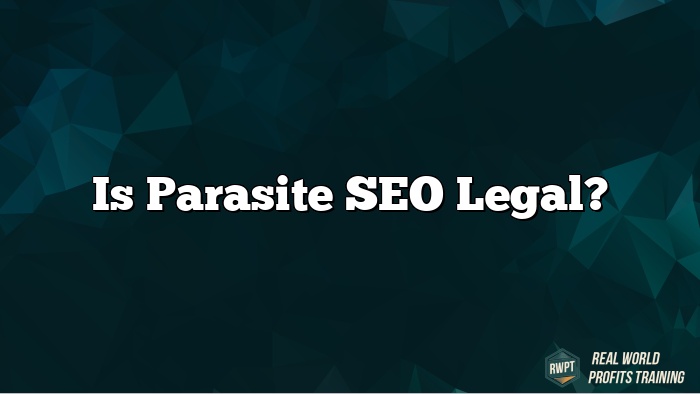A technique as intriguing as its name, Parasite SEO involves leveraging the authority of well-established websites to bolster your own site's search engine rankings.
But here's the catch – is it all above board?
The answer isn't as clear-cut as one might hope.
While Parasite SEO isn't inherently illegal, it tiptoes along a fine line.
Be sure to see the Webinar on Parasite AI.
Legal Aspects
Parasite SEO, a term that makes you squirm just a bit, doesn't it?
In essence, Parasite SEO involves leveraging the high domain authority of well-established sites to rank your own content. It's like riding the coattails of higher, more authoritative brand.
The trick is in the execution.
If you're merely piggybacking on another site's success without adding value, you're treading on thin ice. It's a murky area, but let's break it down.
Copyright infringement is where you could land in hot water. If you're copying and pasting content from another site, you're not only being lazy, you're breaking the law. On the other hand, if you're creating original, relevant content that enhances the user experience, you're playing by the rules.
Spamming is another no-go.
If you're stuffing your content with irrelevant links, you're heading for a fall.
Search engines like Google are no fools, they'll penalize you regardless of who you may be.
Google doesn't care at the end of the day.
How Does Parasite SEO Affect Copyright Laws?
Let's say you're a marketer, and you've found a high-ranking website that's perfect for your parasite SEO strategy.
You create a page on this website, filled with links leading back to your site. You're happy, your website's ranking is climbing, but then, a copyright infringement notice lands in your mailbox.
Why?
Because you've used someone else's platform without their permission. It's like setting up a stall in someone else's shop without asking.
It's not just rude; it's against the law.
The Digital Millennium Copyright Act (DMCA) is a law that protects original content creators. If you're found guilty of copyright infringement, the penalties can be severe, including heavy fines and even jail time.
Now, this doesn't mean all parasite SEO strategies are illegal. There are legal ways to do it. You can guest post on high-ranking blogs or collaborate with influencers.
But remember, always ask for permission before you take a free ride on someone else's website.
So, Parasite SEO can be a double-edged sword. It can help you climb the search engine rankings, but if done wrong, it can land you in legal hot water. Always tread carefully and respect copyright laws.
What Are the Ethical Concerns?
Firstly, it's crucial to note that this practice can lead to content duplication. Imagine spending hours crafting an original piece of content, only to find it replicated on another site, reaping the benefits of your hard work. It's akin to sitting for an exam and having your classmate peek over your shoulder to copy your answers. It's not fair, right?
Secondly, Parasite SEO can result in a loss of control over your content. Once your content is on another site, you have no say over how it's used or presented. It's like lending your favorite book to a friend, only to have them scribble notes in the margins and dog-ear the pages.
Thirdly, there's the issue of brand integrity.
If your content is associated with a site that doesn't align with your brand values, it could negatively impact your reputation. It's like being seen at a party you'd never attend—people might start questioning your judgment.
Parasite SEO can lead to legal complications.
If the host site doesn't approve of your content being there, they may take legal action. It's like setting up a lemonade stand in your neighbor's yard without asking for permission—you're bound to face some backlash.
Wrapping Up
To sum it up, the legality of Parasite SEO is a grey area, with its ethical concerns weighing heavily on the scales. It's a dance on the razor's edge, a cat-and-mouse play between what's legal, what's not, and what's merely frowned upon.
Copyright laws, too, find themselves entangled in this web, challenged and questioned by the very existence of Parasite SEO.
The importance of these topics cannot be understated, as they throw light on the labyrinthine journey of SEO practices and their implications in the legal world. It's a complex puzzle, but with the right pieces, we can begin to see the bigger picture.

